Protectionism
Protectionism: Easy to understand
Protectionism refers to the strategy countries use to limit imports from other nations by imposing tariffs, quotas, or other restrictions. Historically, countries adopted protectionism to shield their growing industries from foreign competition and to preserve jobs. An example is the Smoot-Hawley Tariff of 1930 in the United States, which aimed to protect American businesses during the Great Depression but led to global trade tensions. Today, protectionism remains relevant as countries sometimes use it to protect their economies during economic downturns or to respond to unfair trade practices. For instance, if a country imposes tariffs on imported cars, it might make foreign cars more expensive, encouraging people to buy domestic cars, which can affect consumers' choices and the local economy.

Practice Version

Protectionism: The economic policy of restricting imports from other countries. Protectionism. Historically, protectionism involves using tariffs and quotas to protect a country's domestic industries from foreign competition.